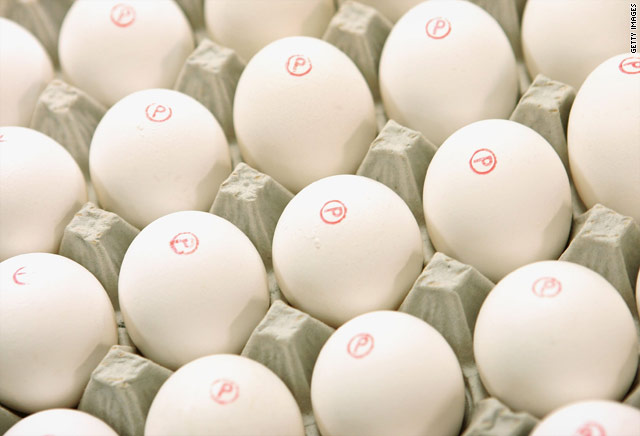Half a billion eggs have been recalled

- Hillandale Farms has recalled some 170.4 million eggs
- The CDC estimates hundreds of Americans have been sickened by contaminated eggs
- Iowa's Wright County Egg has recalled 380 million eggs
The Egg Safety Center has a complete list of recalled eggs, their expiration dates, and brands. Check the situation in your state. Here are safety tips.
(CNN) -- The number of eggs recalled in a nationwide salmonella scare has grown to more than half a billion.
Iowa egg producer Hillandale Farms of Iowa is voluntarily recalling some 170.4 million eggs distributed to stores and companies that service, or are located in, 14 states, a spokeswoman at the Egg Safety Center said on Friday.
The Hillandale eggs were distributed under the Hillandale Farms, Sunny Farms, and Sunny Meadow brand names in six-egg cartons, dozen-egg cartons, 18-egg cartons, 30-egg packages, and five-dozen-egg cases, the website for the Egg Safety Center said.
Loose eggs, which could be repackaged by customers, were packaged under the Wholesome Farms and West Creek brands in 15- and 30-dozen tray packs, according to the Egg Safety Center.
The eggs affected by this recall either have plant number P1860 with date codes ranging from 099 to 230, or plant number P1663 and date codes ranging from 137 to 230, the website said.
The salmonella outbreak prompted Wright County Egg of Galt, Iowa, which began recalling eggs last week, to increase its recall to 380 million eggs on Wednesday.
The number of salmonella cases is expected to grow because infections after July 17 may not have been reported yet due to a two- to three-week lag between when a person becomes sick and when the case gets reported in the system, the CDC said.
When salmonella becomes deadly
"We would certainly characterize this as one of the largest shell egg recalls in recent history," Sherri McGarry of the Food and Drug Administration said in a conference call Thursday.
• Cake batter
• Cookie dough
• Some ice creams
• Steak tartare
• Caesar dressing
• Bearnaise sauce
• Hollandaise
• Homemade mayonnaise
• Aoli
• Eggnog
• Mousse
• Egg white cocktails like a Ramos Gin Fizz
• Tiramisu
• Meringue
POLL:
In wake of recall, will you eat eggs?
On July 9, the FDA announced it had new safety rules for large-scale egg producers, but that came after the salmonella outbreak apparently began.
"The outbreak could have been prevented." McGarry said. "The egg safety rule is in a phase-in approach, but there are measures that would have been in place that could have prevented this if it [had] been placed earlier than in July."
The FDA's new rules cover refrigeration of stored and transported eggs, pasteurization, rodent control, cleanliness and they require a written Salmonella enteritidis prevention plan. The agency said "implementing the preventive measures would reduce the number of Salmonella enteritidis infections from eggs by nearly 60 percent."
Animal welfare groups have criticized conditions of farms operated by Wright County Egg, including the Maine Contract Farming facility in Turner, Maine.
Mercy for Animals, a nonprofit animal welfare group, conducted an undercover video investigation of the farm in 2009, and forwarded its findings to Maine animal welfare officials.
Jack DeCoster, who leads Wright County Egg, in June pleaded guilty to 10 civil counts of animal cruelty over his company's treatment of its chickens, said Dr. Donald E. Hoenig, state veterinarian. DeCoster and his company agreed to a $25,000 fine and made a $100,000 payment to reimburse the state for future monitoring of the facility.
Allegations included too many birds in case, injured chickens not being treated, dead animals not being promptly removed from cages and improper euthanization, Hoenig told CNN.
"Since then, the company ... has followed all of our requirements," he said.
"It's no surprise that these birds that are crammed together, basically defacating on top of other birds," said Dan Hauff, director of investigations for Mercy for Animals. "It's no surprise that this is the outcome, this type of outbreak."
Eggs explained: Free-range, cage-free, organic
Thoroughly cooking eggs kills salmonella bacteria within, but there is still risk of cross-contamination if a food preparer doesn't properly wash kitchen utensils, such as whisks or spatulas, that came into contact with the raw eggs. Undercooked food also leaves the consumer at risk of infection.
Salmonella, which is generally contracted from contaminated poultry, meat, eggs, or water, affects the intestinal tract.
Symptoms include diarrhea, fever and abdominal cramps, which typically begin within 12 to 72 hours, according to the CDC. Vomiting, chills, headache and muscle pains also may occur, according to the Mayo Clinic. These symptoms last about four to seven days, and then go away without specific treatment in healthy people. Antidiarrheal medications may help with cramps, but they may also prolong the diarrhea, the Mayo Clinic said.
The elderly, infants, and people with impaired immune systems are at heightened risk for developing a more serious illness because of salmonella, the CDC said. Some people can develop life-threatening complications if the infection spreads beyond the intestines.
Chickens can pass the bacteria to eggs because the eggs leave hens through the same passageway as feces, according to the U.S. Department of Agriculture's Food Safety and Inspection Service. Alternatively, bacteria in the hen's ovary or oviduct can get to the egg before the shell forms around it, FSIS said.
 Video: Egg recall vindicates
Video: Egg recall vindicates
 Food poisoning 101
Food poisoning 101
 Food safety tips
Food safety tips
After the uptick in salmonella infections, the CDC and the FDA traced the source and determined it was most likely eggs from Wright County Egg. The company says it is working to determine how the shell eggs are being contaminated.
"Wright County Egg is fully cooperating with FDA's investigation by undertaking this voluntary recall," the company said in a statement. "Our primary concern is keeping salmonella out of the food supply and away from consumers. As a precautionary measure, Wright County Egg also has decided to divert its existing inventory of shell eggs from the recalled plants to a breaker, where they will be pasteurized to kill any salmonella bacteria present."
Krista Eberle, director of food safety programs at the Egg Safety Center, which is run by United Egg Producers, a cooperative of U.S. egg farmers, reiterated that only shell eggs are affected by the Wright County recall.
"From what we know they only do shell eggs, and if they did extra egg products, they are still considered to be safe," Eberle said. She added that egg products such as egg whites and dried eggs go through pasteurization and extensive heat treatment, so they're considered safe to eat and the Egg Safety Center is not concerned the other products might be sullied with bacteria.
Country Eggs, Inc. on Thursday said it is voluntary recalling specifically-dated shell eggs produced by Wright County Egg. Eggs were distributed to food wholesalers, distribution centers and food-service companies in California, Arizona and Nevada, according to a statement. Eggs were packaged under the Country Eggs, Inc. brand name in 15 dozen bulk pack with the identifying plant code of P 1946 and P 1026. Julian date codes are 216-221. Dates and codes can be found on the box label.
In addition, NuCal Foods, which, on its website, calls itself the largest distributor of shell eggs in the western United States, announced Thursday it was "voluntarily recalling specific ... dates of shell eggs produced by Wright County Egg and packaged by NuCal Foods because they have the potential to be contaminated with Salmonella."
Wednesday's recall covers eggs branded as Albertsons, Farm Fresh, James Farms, Glenview, Mountain Dairy, Ralph's, Boomsma, Lund, Kemps and Pacific Coast and are marked with a three-digit code ranging from 136 to 229 and plant numbers1720 and 1942, the company said.
The earlier recall covered the Lucerne, Albertson, Mountain Dairy, Ralph's, Boomsma, Sunshine, Hillandale, Trafficanda, Farm Fresh, Shoreland, Lund, Dutch Farms and Kemps brands that were marked with with a three-digit code ranging from 136 to 225 and plant numbers 1026, 1413 and 1946.
The four-digit plant number begins with "P - " and is followed by the three-digit code.
Both recalls affect eggs packed in several different sized cartons, from a half-dozen to 18 eggs. Only shell eggs are affected by the recall, the company said.
Consumers are encouraged to return the eggs in their original packaging to where they were purchased for a full refund.
CNN's Elizabeth Landau, Caitlin Hagan, Val Willingham, Mark Morgenstein and Phil Gast contributed to this report
